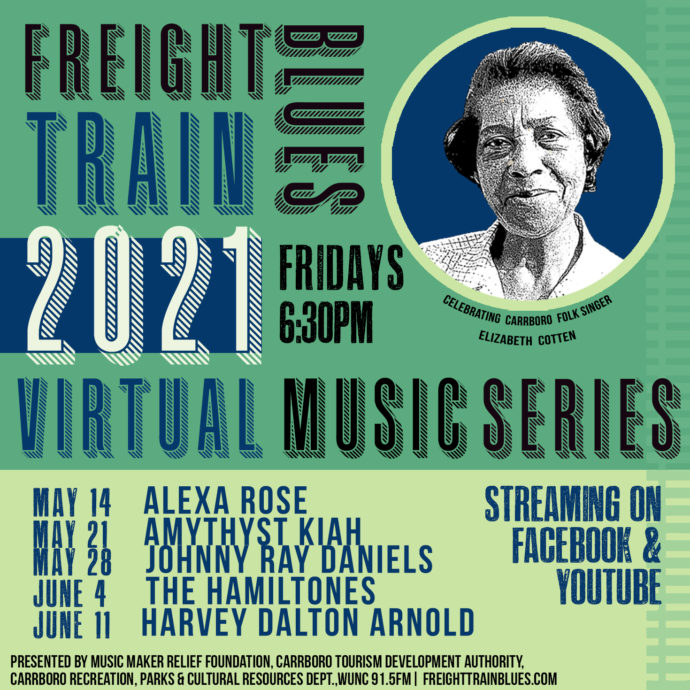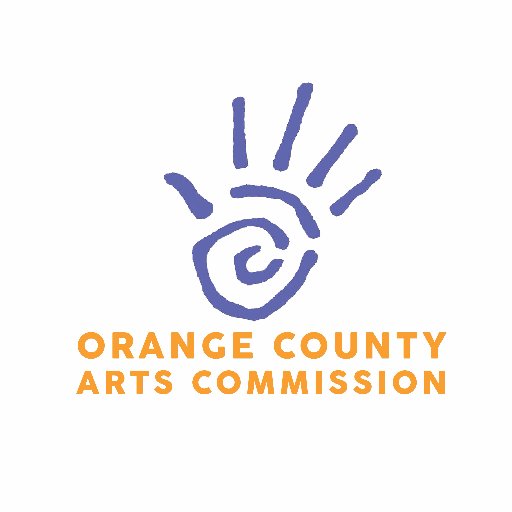Via the Orange County Arts Commission, Article by David Menconi
 The Town of Carrboro’s annual Freight Train Blues Music Series honors the music, memory and legacy of legendary native daughter Elizabeth “Libba” Cotten, born there 128 years ago. But there will be a distinctly contemporary, circa-2021 feel to this year’s edition.
The Town of Carrboro’s annual Freight Train Blues Music Series honors the music, memory and legacy of legendary native daughter Elizabeth “Libba” Cotten, born there 128 years ago. But there will be a distinctly contemporary, circa-2021 feel to this year’s edition.
One aspect is the obligatory nod to safety protocols because of the still-lingering virus pandemic. The five-show series will be all-virtual this year, broadcast on a variety of online platforms – Facebook, YouTube, Soul Bag and Artarie.
Another aspect is the decidedly modern feel of this year’s lineup. All five acts were filmed in performance at The Fruit in Durham at the end of March.
“Usually we have more traditional artists,” says Tim Duffy, head of series co-presenter Music Maker Relief Foundation. “But most everyone like that has been staying home with the pandemic. So it’s a little newer, a little younger.”
Freight Train Blues kicks off May 14 with Alexa Rose, an Appalachian blueswoman from the Alleghany Highlands in the western part of Virginia. May 21 brings Amythyst Kiah, a Tennessee native on the rise thanks to a rocked-up version of her Grammy-nominated song “Black Myself.”
Johnny Ray Daniels, a sacred-soul guitarist who plays with Farmville gospel vocal group Glorifying Vines Sisters, is scheduled for June 4; followed by The Hamiltones, backup singers for Grammy-winning Charlotte r&b singer Anthony Hamilton; and Harvey Dalton Arnold, a bluesman who nevertheless made his bones as bassist in the popular 1970s Southern rock group The Outlaws, in the closing slot on June 11.
In a nod to the past, each show will also feature an “opening act” video of more traditional performers – Durham blues elder John Dee Holeman (who grew up on a farm in Hillsborough and died at age 92 last month), the late great Morganton guitarist Etta Baker and Winston-Salem crooner Captain Luke with guitarist Cool John Ferguson among them. To varying degrees, they all bear the musical influence of Cotten, who is the subject of multiple local murals (see examples A and B).
“’Freight Train’ was one of the first country-pickin’ style songs I ever learned,” says Amythyst Kiah. “Seeing images and videos of a black woman playing guitar the way she did was inspirational. This defining moment led me to explore her legacy and that of other black pickers, resulting in an education on how to pass it on in my own music.”
Born in 1893, Cotten actually predated the town of Carrboro, which was known as West End while she was growing up. She was left-handed and learned to play on a guitar strung for a right-handed player, resulting in a highly idiosyncratic approach to notes and chords. “Freight Train,” one of the great Piedmont blues standards and namesake of this concert series, was a song Cotten wrote before she was even a teenager.
Family obligations took Cotten away from music for most of her adult life, until she was “discovered” in her 60s while working in the Washington, D.C., home of the folklorist Mike Seeger. Cotten emerged as part of the folk-revival boom sweeping American college campuses in the 1950s and ’60s, enjoying a long run on the festival circuit. Before her death at age 94 in 1987, she became the oldest-ever winner of a Grammy Award, a mark that still stands. It’s all part of a quintessentially North Carolina legacy.
“North Carolina has never been about tooting its own horn,” says Duffy. “But maybe that needs to happen more. Mississippi claims to be the birthplace of American music, but I’d say the Carolinas are where American music really originated.”
 Chapelboro.com has partnered with the Orange County Arts Commission to bring more arts-focused content to our readers through columns written by local people about some of the fantastic things happening in our local arts scene! Since 1985, the OCAC has worked to to promote and strengthen the artistic and cultural development of Orange County, North Carolina.
Chapelboro.com has partnered with the Orange County Arts Commission to bring more arts-focused content to our readers through columns written by local people about some of the fantastic things happening in our local arts scene! Since 1985, the OCAC has worked to to promote and strengthen the artistic and cultural development of Orange County, North Carolina.



